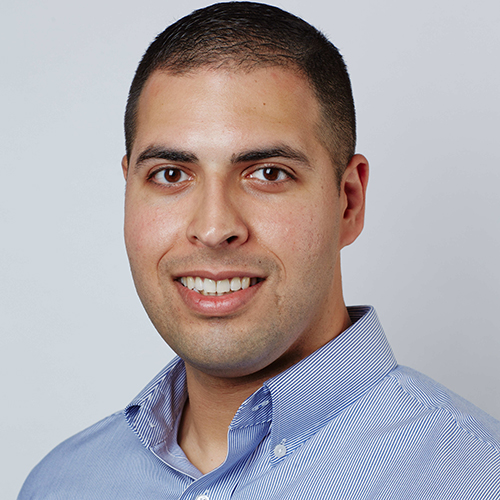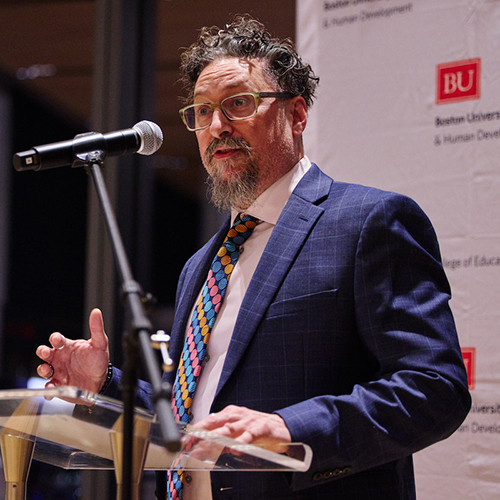Three Hariri Faculty Affiliates win BU Ignition Awards to transform their ideas into life-changing products and services
By Hariri Institute Staff
Hariri Institute Faculty Affiliates Lou Awad, Vijaya Kolachalama, and Hank Fien won BU Technology Development’s 2023 Ignition Awards. These awards, given by BU Technology Development, are designed to accelerate the advancement of promising new science and technology. In addition to a financial grant, award winners receive coaching and support to bring their innovations to market, helping them more easily make the move from academic research to a tangible proof-of-concept required for a company to invest. If successful, the 2023 cohort of scientists and engineers may become Boston’s newest entrepreneurs.
The Ignition Award program awards funds to researchers to advance an idea with clear commercial potential to a valuable inflection point milestone. Designed for researchers who are committed to bringing an idea to market, Ignition Awards funds are often used to achieve milestones such as generate compelling data, show proof-of concept, create a prototype, etc.
Learn more about their work below.
Lou Awad – Helping Stroke Victims Walk Again

Each year, nearly 800,000 Americans suffer a stroke that hinders their ability to speak, walk, see, or move certain muscles. Although immediate care can help people survive their initial medical emergency, they are often left with lifelong disability, and require assistive devices like wheelchairs to get around.
Lou Award is a Hariri Institute Research Fellow and Associate Professor of Physical Therapy at the College of Health and Rehabilitation Sciences (SAR), and his lab have developed a new AI-driven therapeutic device that could help people restore their walk after a stroke. This wearable device, called reNeu, can stimulate and contract calf muscles, which help lift and lower a patient’s foot, generating nerve activity that strengthens the parts of the brain responsible for those movements. reNeu, which is small enough to fit on the calf, is highly adaptable: as a patient walks across different ground surfaces, advanced gait algorithms detect the leg’s motion and adjust the timing of the electrical impulses accordingly. This important advancement will help patients relearn how to walk in real-world conditions, where ground surfaces change constantly and each step is different from the last.
Vijaya Kolachalama – Diagnosing Dementia with AI

Patients grappling with neurodegenerative conditions like Alzheimer’s disease and Parkinson’s disease often present comparable symptoms of memory loss and neurological dysfunction. However, distinguishing between these disorders is vital due to distinct underlying causes and management strategies. Detecting these differences early can significantly impact a patient’s prognosis.
To address this challenge, Vijaya Kolachalama has developed an innovative AI-powered solution. Leveraging medical data, imaging, and clinical tests, his software can pinpoint specific forms of dementia even before significant symptoms manifest. This enables healthcare professionals to tailor precise therapies and interventions. Kolachalama is an Associate Professor of Medicine and Computer Science at the BU Faculty of Computing & Data Sciences and Chobanian & Avedisian School of Medicine.
With the support of Ignition Award funding, Kolachalama aims to validate the tool in clinical settings, ultimately presenting it to physicians and potential investors to enhance patient care and outcomes.
Hank Fien – Teaching Reading with Smart Software

In 2022, the nation’s student performance report card—the National Assessment of Educational Progress—found a majority of American fourth and eighth graders were reading at or below a basic level. To help bridge that gap, Hank Fien is creating an AI-enhanced digital platform for teaching and assessing reading skills.
The new system, which builds on a paper-based reading intervention Fien, the Nancy H. Roberts Professor of Educational Innovation at BU Wheelock College of Education & Human Development, helped create in 2015, provides game-like lessons on a web interface or mobile device. As students play through these lessons, the AI-backed software immediately identifies the skills they need to improve, provides more lessons that reinforce those skills, and flags those areas for teachers so they can provide individualized attention. The system is not yet available for widespread use, but Fien—who is also director of the Wheelock Institute for the Science of Education—will use Ignition Award funding to continue developing a viable product while testing its efficacy in school classrooms throughout the Boston metro area.
The 2023 Ignition Awards have been given to eight projects. Read the full story about BU Ignition Awards and all the winners in The Brink story by David Levin.